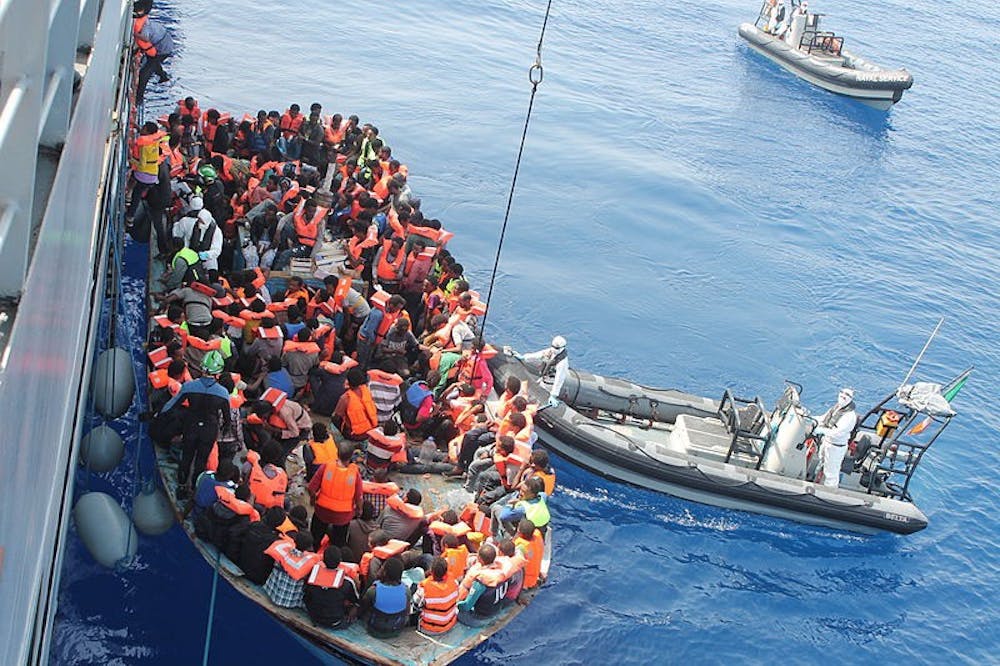Mustard gas, mass migration and the Middle East are dominating headlines as Europe is faced with an unanswered question — where are hundreds of thousands of refugees going to live?
In the past four years, a civil war broke out in Syria when pro-democratic citizens challenged their authoritarian government, according to the BBC.
Since then, more than 200,000 people have died from fighting. As a result, countless thousands of people fled the country to find a better life in Europe. In addition, migrants from other impoverished and war-torn regions of the Middle East and North Africa are fleeing to safer and wealthier nations.
The journey can be perilous, as hundreds died trying to cross the Mediterranean Sea in crowded boats, while dozens more were found dead in trucks on European highways. If the trek was not dangerous enough, many were initially not allowed to move to the country they wished, due to international laws.
The European Union (EU) has a rule in place that states immigrants must apply for asylum in the country they first enter, which has mostly been Greece — causing the country to be overwhelmed.
Several EU member states ignored the rule, resulting in a mass migration away from Greece and largely to Germany.
The United Nations (U.N.) is currently working to relocate thousands of refugees from highly impacted countries to those more prepared to handle the crisis, reported the U.N. News Centre.
“The proposed relocation scheme for 160,000 refugees from Greece, Italy and Hungary would go a long way to address the crisis,” said William Spindler, a spokesperson for the Office of the U.N. High Commissioner for Refugees.
The U.S. is one of the newest nations to accept Syrian immigrants, reported CBS News.
“The refugee crisis is not just a European problem; it’s a world problem, and we have obligations,” said President Barack Obama, last week.
While Germany expects to take in 800,000 migrants by the end of the year, the U.S. plans to accept 10,000 people over the course of 12 months, according to USA Today and CBS News.
As Germany is bearing the brunt of the relocation process, the other 27 EU member states are struggling to agree on quotas. The problem, however, is only going to get worse as a new threat emerges in the Middle East.
According to BBC, an unnamed U.S. official confirmed the Islamic State (IS) is producing and using mustard gas. A BBC team reported it found evidence of the official’s claim.
Sulfur mustard, commonly referred to as mustard gas, causes irritation of the skin and eyes. Though it can blister the skin, it is usually not lethal. The chemical weapon was largely used during World War I. Since then, the U.N. has taken several measures to ban the use of mustard gas.
Chemical weapons were employed against Syrian rebels and civilians in years past, which is one of the reasons so many people have fled the country. If IS uses mustard gas it will only encourage more people to find refuge in Europe.
The migration crisis affecting Europe, and now the U.S., is a direct result of widespread turmoil and poverty caused by IS.
The international problem can only be fixed through international cooperation. If political and economic stability can be achieved in Syria and Iraq, the hundreds of thousands of displaced peoples may be able to return to their homes.
Public support to intervene in the Middle East is largely absent, especially in the wake of the 14th anniversary of the 9/11 terrorist attacks. The grim reminder of years of wars only dissuades Americans and Europeans alike to revisit the ongoing conflict in the foreign deserts.
Until there is a solution, it is likely more refugees will pour into Western nations. The affects of the crisis will eventually trickle down to Shippensburg University students, who, as young voters, will have the opportunity to voice their opinions on major issues.
Should the U.S. accept refugees as new neighbors? Can military intervention solve the crisis? Or should the problem stay on the other side of the Atlantic Ocean?




The Slate welcomes thoughtful discussion on all of our stories, but please keep comments civil and on-topic. Read our full guidelines here.